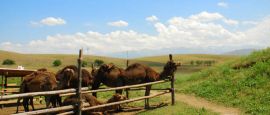Kazakhstan History, Language and Culture
History of Kazakhstan
Kazakhstan's history is a rich tapestry woven from its ancient nomadic traditions and strategic position in Central Asia. Early inhabitants of the region included nomadic tribes such as the Saka and Scythians, who roamed the vast steppes.
The region also played a crucial role in the Silk Road, the vast network of trade routes that linked China, the Middle East, and Europe. Caravans carrying silk, spices, and precious goods passed through Kazakhstan, leaving behind a lasting cultural and economic impact. Even today, remnants of this trade route can be seen in historic sites such as Otrar and Sauran.
In the 13th century, the area fell under the dominion of the Mongol Empire, becoming part of the Golden Horde. By the 15th century, the Kazakh Khanate emerged, consolidating various nomadic groups and laying the foundation for modern Kazakh identity. However, internal divisions and external pressures led to parts of Kazakhstan being gradually annexed by the Russian Empire during the 18th and 19th centuries.
Following the 1917 Russian Revolution, Kazakhstan underwent several administrative changes, eventually becoming the Kazakh Soviet Socialist Republic in 1936. During this period, the region experienced significant industrialisation and demographic shifts, partly due to Soviet policies and forced relocations.
Kazakhstan declared its independence from the Soviet Union on 16 December 1991, marking the beginning of its journey as a sovereign nation. Since then, it has pursued economic development and established itself as a key player in Central Asia.
Did you know?
• The Baikonur Cosmodrome in southern Kazakhstan is the world's first and largest space launch facility.
• Kazakhstan is the world's largest landlocked country. Despite having no coastline, it has a vast network of lakes and rivers, including the Caspian Sea, the world's largest inland body of water.
• Apples originated in Kazakhstan. The modern apple traces its roots to the Tian Shan mountains near Almaty, where wild apple trees still grow.




 You know where
You know where